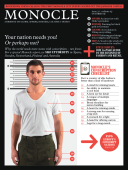
Issue 27
Why the world needs more states with conscription – not fewer. For a special Monocle report, we sign up for duty in Spain, Sweden, Switzerland, Finland and Australia.
In This Issue
Oops! No content was found.
Looks like we no longer have content for the page you're on. Perhaps try a search?
Return Home

